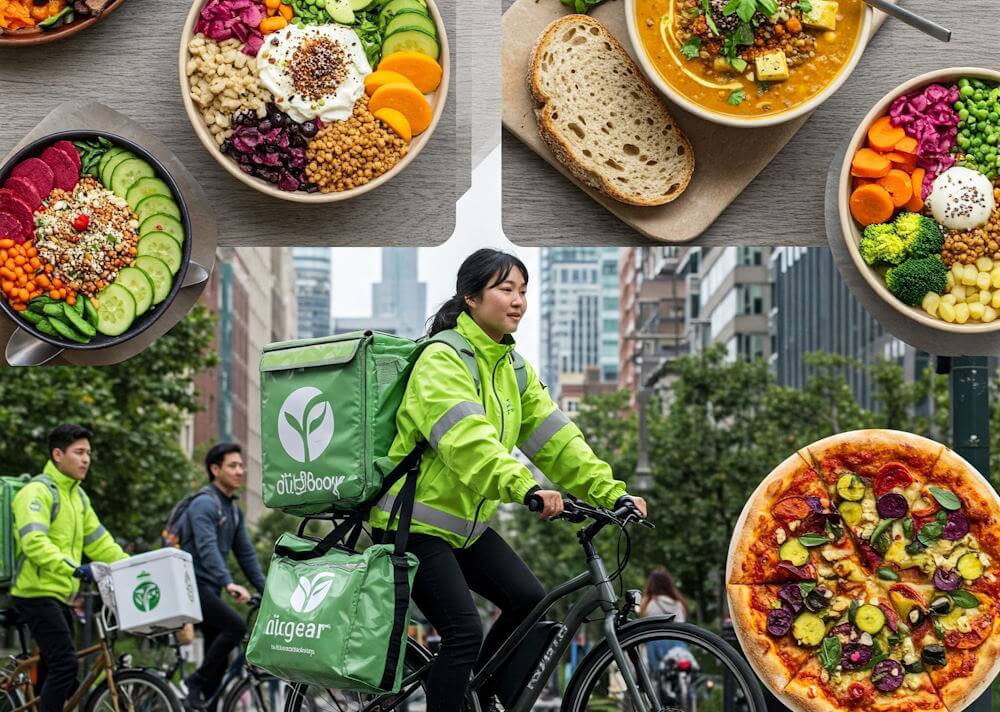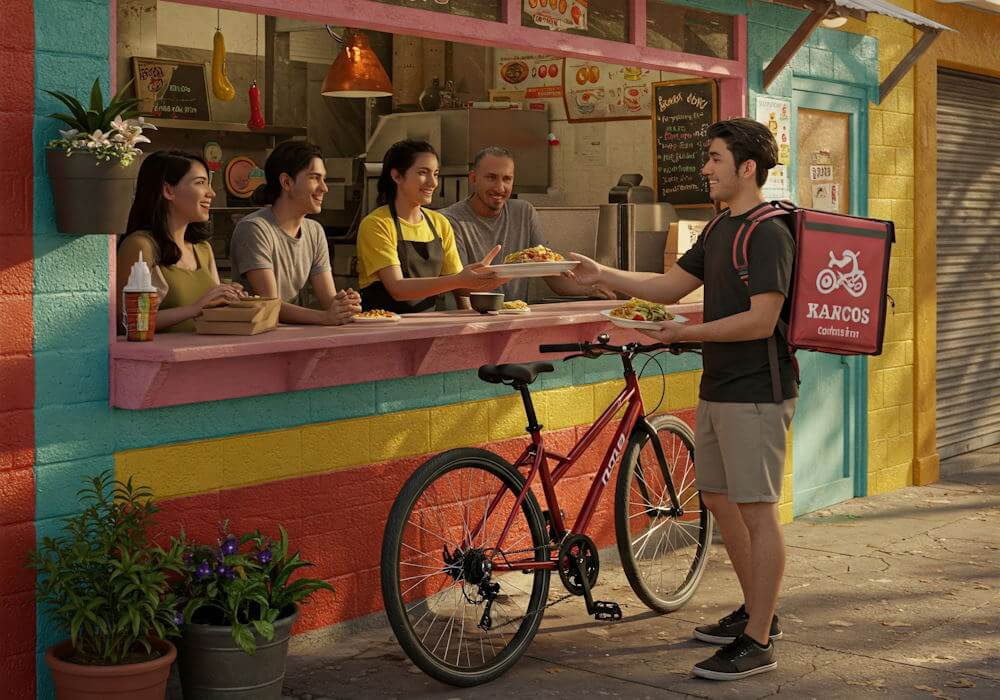The plant-based diet has seen a remarkable surge in popularity over the past several years, driven by various factors ranging from health consciousness to environmental advocacy. A growing body of research highlights the numerous health benefits associated with plant-based eating, such as reduced risks of chronic illnesses, improved heart health, and better weight management. These health considerations have inspired many individuals to reevaluate their dietary choices, leading to an increased demand for plant-based meal options across various sectors, including food delivery services.
Moreover, environmental concerns are playing a significant role in this trend. The impact of animal agriculture on the planet is well-documented, contributing to deforestation, greenhouse gas emissions, and water usage. As awareness of climate change intensifies, consumers are increasingly turning to plant-based diets as a more sustainable alternative. This shift not only reflects personal health priorities but also a collective responsibility towards the environment, prompting food delivery companies to adjust their menus to cater to this emerging demand.
Additionally, the cultural perception of plant-based meals is evolving. What was once seen as a niche lifestyle is now becoming mainstream, appealing to a broader audience beyond traditional vegetarians and vegans. Food delivery services, recognizing this shift, are embracing the plant-based trend by expanding their offerings to include a variety of meal options that cater to diverse palates. This transition is indicative of broader consumer sentiment, as more individuals seek flavorful, convenient, and nutritious meal solutions that align with their values.
As a result, the food delivery industry is experiencing a transformative phase, integrating plant-based meals into their core offerings. This transition not only satisfies consumer demand but also aligns with the growing trend of mindful eating practices that prioritize both health and sustainability.
Consumer Demand for Plant-Based Options
As the world navigates through pressing environmental concerns, consumer preferences are increasingly shifting towards plant-based meals. Recent studies indicate a significant rise in the adoption of vegetarian and vegan diets. According to a report by the Plant-Based Foods Association, sales of plant-based foods have surged by over 27% in the past two years, reflecting a growing inclination for sustainable eating habits. This trend is not merely a fleeting phase; it represents a fundamental shift in consumer behavior as individuals become more conscious of their dietary choices.
Furthermore, a survey conducted by the International Food Information Council revealed that nearly 40% of Americans are now actively trying to incorporate more plant-based foods into their diets. This statistic underscores a burgeoning demand for options that cater to health, flavor, and convenience. Consumers expect plant-based meals to deliver on taste and satisfaction just as well as their meat-based counterparts. The growing popularity of plant-based options is encouraging food delivery services to innovate and expand their menus, ensuring they meet consumer expectations in terms of taste, variety, and nutritional value.
Interestingly, the appeal of plant-based meals is multifaceted. Many consumers are drawn to these options for their perceived health benefits, as they are often associated with lower rates of chronic diseases, improved digestion, and weight management. In addition, ethical considerations and environmental sustainability are driving many individuals to explore dietary patterns that prioritize plants. This dual focus on personal health and global responsibility is fostering a dynamic marketplace where plant-based options are increasingly prevalent. Moreover, it compels restaurants and food delivery services to adapt their strategies to accommodate this evolving consumer landscape, paving the way for a greener future in the food industry.
Impact of Plant-Based Meals on the Environment
The rising popularity of plant-based meals presents significant environmental benefits, particularly in the context of the food delivery industry. Transitioning to a diet that favors plant-based ingredients can dramatically reduce individuals’ carbon footprints. Research indicates that producing plant-based foods generally emits fewer greenhouse gases compared to their animal-based counterparts. For instance, vegetables, grains, and legumes require considerably less energy, water, and land for cultivation, which translates into lower environmental impact.
Moreover, choosing plant-based meals significantly contributes to biodiversity conservation. Livestock farming heavily contributes to habitat destruction and biodiversity loss; therefore, by promoting plant-based diets, food delivery services indirectly support sustainable land use practices. This shift not only benefits the planet but also instigates a change in consumer habits towards more responsible eating, which is crucial for future sustainability.
Food delivery services have the potential to play a vital role in this movement by incorporating plant-based meals into their menus. They can also prioritize sustainable sourcing, supporting farmers who employ eco-friendly practices. This not only enhances the quality of the food offered but also assures consumers that their choices are fostering a healthier environment.
In essence, the food delivery industry’s adoption of plant-based meals marks a significant stride towards environmental sustainability. By embracing this change, these services can help mitigate the detrimental effects of traditional food systems on our planet. Implementing further initiatives, such as reducing packaging waste and maximizing the use of seasonal ingredients, would further bolster their efforts to create a greener food delivery model.
Innovations in Plant-Based Food Technology
The landscape of the food delivery industry has been significantly transformed by advancements in plant-based food technology. As consumer demand for nutritious and sustainable meal options continues to grow, innovative ingredients and products have emerged, providing food delivery services with the tools needed to offer appealing plant-based meals. These developments not only improve the taste and texture of plant-based offerings but also enhance the presentation, making them more visually appealing to consumers.
One notable advancement is the use of novel plant-based proteins, such as pea protein, fava bean protein, and lentil protein, which contribute to improved texture and mouthfeel. These ingredients mimic the fibrous texture of meat, making them an excellent alternative for those seeking meatless meals. Furthermore, innovations in flavor technology have allowed manufacturers to recreate the savory and umami flavors that consumers often seek. Techniques such as fermentation and the use of spices have been integrated to enhance the overall flavor profile of plant-based dishes.
Aside from the proteins, the emergence of new plant-based dairy alternatives has also garnered attention. Advances in the production of oat milk, almond cheese, and coconut yogurt have allowed for a diverse range of creamy textures without the use of animal products. These alternatives not only cater to a broader audience, including those with lactose intolerance, but also elevate the culinary experience by introducing variety.
Additionally, modern food presentation techniques, such as the use of vibrant colors and attractive plating, have played a crucial role in enhancing the appeal of plant-based options. The visual aspect of food cannot be overlooked; innovative delivery packaging that emphasizes freshness and sustainability further entices consumers. As a result, food delivery services are now able to showcase a wide range of plant-based meals that are as delectable as they are nutritious, driving a shift towards more sustainable eating habits.
Case Studies of Successful Food Delivery Services
As the demand for plant-based meals continues to rise, several food delivery services have successfully integrated these offerings into their menus, creating compelling case studies for industry peers. One prominent example is Freshly, a meal delivery service that emphasizes convenience and health. Freshly has expanded their menu to include a variety of plant-based options, appealing to consumers seeking nutritious yet quick meal solutions. Their marketing strategy focuses on highlighting the culinary creativity behind these meals, such as their hearty vegan chili and quinoa bowls, which has resonated well with their customer base. This approach not only attracts plant-based eaters but also supports flexitarians looking to incorporate more meatless meals into their diets.
Another noteworthy case is Purple Carrot, a service dedicated solely to plant-based meals. Purple Carrot has carved out its niche by providing not just meals but also recipes for customers to prepare at home. Their emphasis on sustainability and health aligns with the increasing consumer trend favoring plant-based diets. Purple Carrot leverages social media effectively to showcase user-generated content, driving engagement and reinforcing community among plant-based eaters. The success of their “Chef’s Choice” meal plan, containing innovative dishes like lentil-powered bolognese and coconut curry, illustrates the growing appetite for diverse plant-based offerings.
Finally, Dinnerly has also made strides by incorporating plant-based options into their more traditional meal kit delivery. This service offers flexibility through plans that introduce customers to a rotating selection of vegetarian dishes. Their commitment to affordability and variety has allowed Dinnerly to cater to a broader audience, from avid meat eaters to those interested in exploring plant-based meals without a hefty price tag. Overall, these case studies demonstrate that food delivery services can successfully adopt plant-based meals by aligning menu offerings with consumer interests, focusing on convenience, quality, and sustainability.
Challenges Faced by Food Delivery Companies
As the food delivery industry continues to adapt to the increasing demand for plant-based meals, numerous challenges have arisen that companies must navigate. One significant hurdle is sourcing high-quality ingredients that align with plant-based dietary preferences. Unlike traditional meal ingredients, which may be readily available, plant-based options can require specialized suppliers committed to sustainability and quality. Companies need to establish robust supply chains that secure fresh produce, grains, and plant proteins while remaining competitive in pricing. This adjustment can lead to increased operational costs, a factor many companies are cautiously addressing.
Consumer misconceptions surrounding plant-based diets also present a considerable challenge. Despite a growing trend towards plant-based eating, many consumers still harbor reservations about the taste, nutritional value, and overall satisfaction of these meals compared to their traditional counterparts. Food delivery companies must not only offer diverse and appealing menus but also invest in marketing strategies that educate potential customers about the benefits of plant-based options. Overcoming these misconceptions through transparent communication and engaging content is essential to encourage trial and adoption of plant-based meals.
Moreover, competition with traditional meal delivery services adds another layer of complexity. Many companies are entrenched in consumer habits, and the allure of meat-based offerings often overshadows the burgeoning plant-based segment. Food delivery companies must work diligently to differentiate their plant-based offerings by focusing on unique flavors, creative recipes, and strategic partnerships with renowned chefs or influencers in the plant-based community. Competing on price without compromising quality further complicates this landscape, urging companies to strike a balance between profitability and ethical responsibility.
Marketing Plant-Based Meals Effectively
To successfully market plant-based meals, food delivery companies must first identify and understand their target audience. This demographic is increasingly composed of health-conscious individuals, environmental advocates, and consumers who are curious about new dietary trends. Conducting market research to uncover preferences, motivations, and dining habits can aid in crafting tailored marketing messages. Emphasizing health benefits, such as lower cholesterol and better weight management, can resonate with those seeking a healthier lifestyle.
Utilizing social media platforms is essential for food delivery services aiming to promote their plant-based offerings. Instagram, Facebook, and TikTok serve as powerful tools for engaging potential customers, as visually-stimulating food content tends to perform exceptionally well. High-quality images and videos showcasing the vibrant colors and textures of plant-based dishes can attract attention and spark interest. Engaging with followers through polls, comments, and user-generated content can foster a sense of community around plant-based eating. Collaborating with influencers who promote sustainable living or healthy eating can also enhance credibility, as their endorsements reach a wider audience.
Branding plays a critical role in marketing plant-based meals. Companies should create a clear and appealing brand identity that highlights the values of health, sustainability, and ethical consumption. Packaging should reflect these principles through eco-friendly materials and clear messaging that educates consumers on the environmental impact of their food choices. Marketing campaigns should emphasize not only the deliciousness of plant-based meals but also their positive contributions to personal health and the planet. By weaving these themes together, food delivery companies can position themselves as leaders in the growing plant-based movement, ultimately attracting more customers seeking nutritious and sustainable options.
Collaboration with Influencers and Nutritional Experts
In the evolving landscape of the food delivery industry, the collaborative efforts between providers of plant-based meals, influencers, chefs, and nutritional experts assume a pivotal role. The strategic alliance with influencers enables companies to harness the reach and trust that these individuals have cultivated with their followers. As advocates for healthy eating and sustainable living, influencers can effectively disseminate information regarding the advantages of adopting a plant-based diet, making it more accessible to a broader audience.
Influencers often serve as the bridge that connects food delivery services to potential consumers. Their authentic, relatable content can captivate individuals who may be hesitant to embrace plant-based meals. By showcasing the taste, convenience, and health benefits of these meals, influencers play a significant part in demystifying plant-based eating and presenting it as an appealing choice. Moreover, their endorsements can facilitate brand loyalty—consumers are more likely to try a meal delivery service recommended by someone they trust.
Additionally, collaboration with culinary experts and nutritionists enriches the credibility and educational aspect of these partnerships. Chefs, with their creativity and expertise, can develop innovative, flavorful plant-based recipes that appeal to varied tastes. When these chefs collaborate with food delivery services, they contribute to a menu that not only captivates the palate but also highlights nutritional value. Nutritionists further enhance this initiative by providing evidence-based insights on the health benefits associated with plant-based meals, particularly in relation to chronic disease prevention and overall well-being.
In conclusion, the food delivery industry’s shift towards plant-based meals is significantly influenced by partnerships with influencers and nutritional experts. These collaborations not only enhance credibility but also serve to educate and attract a broader consumer base to the myriad of benefits that a plant-based diet offers.
The Future of Plant-Based Delivery Options
The food delivery industry is witnessing a significant evolution, particularly with the growing demand for plant-based meals. This shift, propelled by increasing health consciousness among consumers and a rising awareness of environmental sustainability, suggests a promising future for plant-based delivery options. As these trends continue to gain momentum, food delivery services will need to adapt to stay competitive and meet changing customer preferences.
Emerging trends indicate that more consumers are opting for plant-based diets, which is expected to result in an exponential growth of plant-based meal options within delivery services. A recent study indicates that the demand for vegan and vegetarian meals has surged, with many restaurants expanding their menus to include a wider variety of plant-based dishes. This trend highlights not only consumer interest but also the necessity for food delivery platforms to diversify their offerings to include these options.
To capitalize on the anticipated growth in plant-based delivery, food services will need to innovate their logistics and partnership models. This includes collaborating with specialized plant-based food brands and local suppliers to ensure quality and freshness. Furthermore, employing sustainable packaging solutions will resonate with the environmentally conscious demographic, making it a crucial component of the delivery service strategy. Technology may also play a pivotal role; utilizing apps or platforms that provide detailed nutritional information on plant-based meals could enhance customer engagement.
In anticipating future developments, food delivery companies should monitor consumer feedback and preferences closely. By staying attuned to market trends and integrating plant-based principles into their offerings, these companies will not only cater to a growing segment of the population but also foster a culture of sustainability. The versatility and nutritional benefits of plant-based meals position them as a significant player in the food delivery landscape, promising a shift toward a more plant-centric culinary future.





